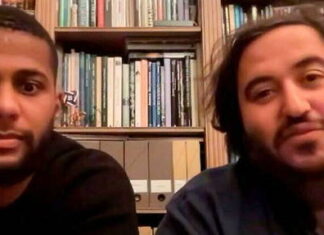Don’t talk to them about a crisis! Three years after inaugurating La Scala in Paris and despite a turbulent start (“between the Yellow Vests demonstrations and the Covid pandemic, we were really spoiled”, they smile), Frédéric and Mélanie Biessy ward off the economic difficulties of the moment by opening a new venue in Avignon dedicated to performing arts. This establishment, baptized La Scala Provence, raises the curtain on July 7 in place of the former Capitole cinema, rue Pourquery-Boisserin, a stone’s throw from rue de la République, the main artery of the city of the popes. This “theatrical complex” has 4 halls and 1,000 seats in total.
“Once again, the Biessys have seen the big picture. Their new place is magnificent,” enthuses Alexis Michalik, who plays there, alternating with Paul Lapierre, Une histoire d’amour in the “off” of the Festival d’Avignon. In addition to Alexis Michalik’s piece, created at La Scala Paris, where it has been performed more than 400 times, around thirty artists will be performing at the venue all summer long. Among them ? Benoit Solès in La Machine de Turing directed by Tristan Petitgirard, but also Jos Houben for a comic one-man show, L’Art du rire, or even Fabrice Drouelle who adapts his program Affaires sensible for the stage. Many musicians will also perform there between July and August (Renaud Capuçon, Guillaume Bellom, Francesco Tristano), as well as comedians (La Framboise frivole, Marc Jolivet) and even circus troupes.
OPENING OF LA SCALA PROVENCE ON JULY 7 IN AVIGNON – 4 ROOMS, 1000 ARMCHAIRS Ask for the program for Room 600!
“We intend to offer La Scala Provence a program as diverse as that of our Parisian rooms”, states Frédéric Biessy. “We want to show as many things as possible without limiting ourselves to a particular genre,” adds his wife, Mélanie. “To bring such an important private structure to life, it is necessary to offer a wide range of shows in order to meet all expectations”, analyzes Alexis Michalik.
After six months of work and 5.5 million euros of investment (compared to 20 million for La Scala Paris), the Biessy spouses intend to make this structure much more than a place of diffusion. The facility will remain open year-round. Out of season, it will turn into a place of residence for artists. Directors, actors and also musicians will be welcomed there for varying durations depending on the project. And in the eight recording studios installed on site will be recorded the discs of the Scala Music label, which the Biessy spouses have just founded.
This multidisciplinary place, where theatre, dance and music but also various performances and visual arts mingle, Mélanie and Frédéric Biessy declare that they envisage it as a kind of “Factory”, in reference to Andy Warhol’s New York studio where From 1964 to 1987, the great figures of the contemporary art and rock scene met. Their ambition is to create a kind of incubator there, or even an artistic incubator.
Although their business project cannot be compared to that of an NGO, Frédéric and Mélanie Biessy nevertheless plan, in the medium term, to transform their company into a foundation. “We are planning our project for the long term. Our action does not simply aim to program shows, but to support artists from one end of their projects to the other”, explains Frédéric. “We don’t want to become a chic garage that only programs creations from elsewhere. We also want to participate actively in it,” adds Mélanie Biessy.
It is in this spirit that she is now clearing a new playground: the seventh art. Mélanie Biessy has just created, on her own, her own film production company (Scala films). His first feature film, co-produced with Charles Gillibert, should see the light of day between 2023 and 2024. It will be the adaptation of Olivier Guez’s novel, The Disappearance of Josef Mengele, brought to the screen by Kirill Serebrennikov. A creator who, like the Biessys, plays with borders. Evidenced by his latest creation, currently offered in the main courtyard of Avignon. This adaptation of Anton Chekhov’s Black Monk cheerfully mixes languages (Russian, German and English) but also artistic disciplines (dance, music, cinema and theatre).


















